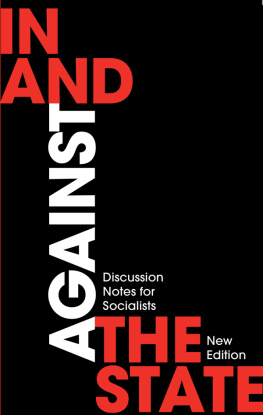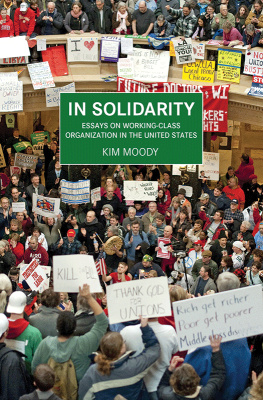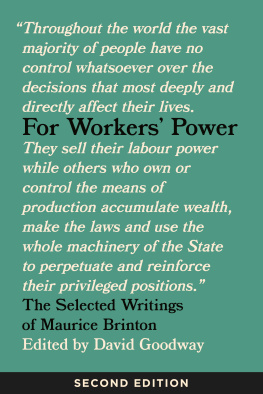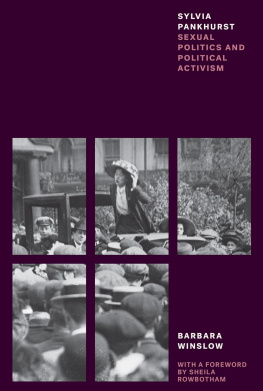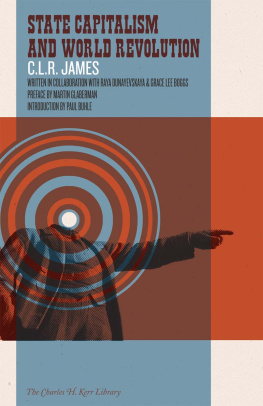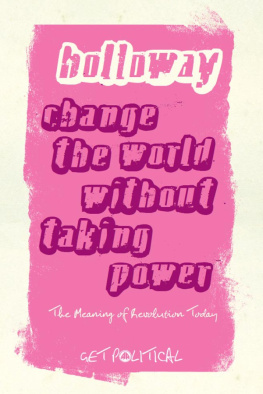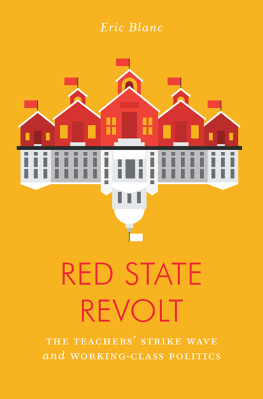The first edition of In and Against the State was written, designed and self-published in 1979 as a pamphlet by the London Edinburgh Weekend Return Group Cynthia Cockburn, John Holloway, Kathy Jenkins (then Kathy Polanshek), Neil MacInnes, Jeanette Mitchell and Olga Stasinopoulou. For the revised and expanded edition, published by Pluto Press in 1980, the group expanded to include John MacDonald, Donald MacKenzie and Nicola Murray.
New edition published 2021 by Pluto Press
345 Archway Road, London N6 5AA
www.plutobooks.com
Copyright London Edinburgh Weekend Return Group 1979, 1980, 2021
The right of the individual contributors to be identified as the authors of this work has been asserted in accordance with the Copyright, Designs and Patents Act 1988.
A Bed for the Night translated by George Rapp and reproduced by permission of Eyre Methuen Ltd from eds. John Willett & Ralph Manheim Bertolt Brecht: Poems 19131956 Volumes 3 and 4 of Gedichte: copyright Suhrkamp Verlag Frankfurt am Main 1961
British Library Cataloguing in Publication Data
A catalogue record for this book is available from the British Library
ISBN 978 0 7453 4180 4 Hardback
ISBN 978 0 7453 4181 1 Paperback
ISBN 978 1 78680 690 1 PDF
ISBN 978 1 78680 691 8 EPUB
ISBN 978 1 78680 692 5 Kindle
This book is printed on paper suitable for recycling and made from fully managed and sustained forest sources. Logging, pulping and manufacturing processes are expected to conform to the environmental standards of the country of origin.
Typeset by Riverside Publishing Solutions
Simultaneously printed in the United Kingdom and United States of America
Foreword to the New Edition
John Holloway
Delighted-surprised-fascinated that the book is being re-published after 40 years (wow!). Let it stir discussion, make people argue. That is what we wanted.
What can we do if we work for the state? We know that the state is a capitalist state; we know that capitalism is a disastrous form of social organisation that causes untold misery and may well be taking us towards extinction. We know that if we work for the state we are participating in this destruction. So what can we do? Is there some way that we can go in the opposite direction, create spaces or at least moments in which we push against the reproduction of this dreadful system and open paths towards the creation of a non-capitalist world?
That question was the original impulse for In and Against the State. We wanted to get away from the Penelope concept of militancy, weaving capital during the day and then unravelling it in the evenings and at weekends. We wanted to find a way of turning our daily activity against capital. We were thinking primarily of teachers and social workers and community workers and students but also more generally in terms of anyone who comes into contact with the state. Is there some way in which we can use the fact that the state, although a capitalist state, is not capitalist driven solely by profit, in order to create something different? In my case, as someone who teaches in a public university part of a capitalist state (like other public universities), this is a constant preoccupation.
It all started when a group of us in Edinburgh, thinking about the capitalist state, read Cynthia Cockburns book, The Local State, and got in touch with her. Out of that grew the London Edinburgh Weekend Return Group (LEWRG), named after a special promotion on British Rail that made it possible for us from Edinburgh to travel to London for weekends and for the Londoners to do the same in the opposite direction. It was an exciting coming together, and we decided to write a book to throw into the debates of the times. The first edition, with lots of photos, was self-produced under the aegis of CSE Books, and then Pluto published a second, expanded edition a year or so later.
Think of the state as a how, not a what. Perhaps that is the main argument. Think of the state not in terms of what it does, but how it does it. The state is a form of social relations, a way of doing things. It is a way of excluding people, a way of reproducing authoritarian relations. Even when we are in the state, we can be against the state by trying to turn things around, to walk in the opposite direction. Too often, the left thinks of the state in terms of what it does or what it should do, as though the state itself were a natural or neutral form of organisation. But no: the whole question of changing society is a question of how we organise, how we make decisions and do things.
That is what excites me about the interview with John McDonnell included in this book. He talks about the whole concept of in and against the state as being how you bring people in, how you open up the doors of the state itself, and how you start changing its relationships. I agree completely with that. For him, that was at the centre of the Greater London Council (GLC) experience. Until reading the interview (yesterday), I did not know that our book had any direct influence on that process, although we were certainly conscious of sharing the same vibrations of excitement and at least one of us, Jeannette Mitchell, was actively involved in the GLC.
Opening up the doors of the state is to destroy the state as a form of social relations, to create in its place a different form of social organisation. Millions of us, all around the world, are trying to do that, to turn the state against the state. But both Seth Wheelers introduction and John McDonnells interview have taken me by surprise and made me think. When we wrote In and Against, we (or certainly I) were thinking of people who are situated in the state or in contact with the state by virtue of what we do. It was on that basis that we chose the interviews that make up the first part of the book. We were not thinking of choosing to go into the state in a party-political sense; we were not thinking of the Labour Party or Corbynism or the recent struggles around that tendency. Seths introduction and Johns interview fascinate me because they take the In and Against the States argument beyond our original intention and in a slightly different direction.
The argument fascinates me, but does it convince me? I have my doubts. I think we must and can turn our own activities within the state apparatus against the state as a form of social relations. In that sense, we can dissolve the state as a form of doing things and as a form of reproducing capital. I think that we can do it, or try to do it, in our own activities and, at least for moments, at a local, perhaps municipal level: hence, the wave of excitement that hits me when I read John McDonnells account of the GLC. To achieve that at a national level and in a political party is probably much more difficult, because both the concept of nation and the organisation of a political party are difficult to disentangle from the reproduction of capital. To achieve it in the context of a left government I find it difficult to imagine simply because opening up the doors of the state itself is probably completely incompatible with promoting the accumulation of capital on which the state depends. The contrast between the tone of Johns account of the GLC and his account of the Corbynite Labour Party is striking and suggests that it would be important to think not just what did we do wrong? but also is there something structural in the state that means that our project could not succeed?

